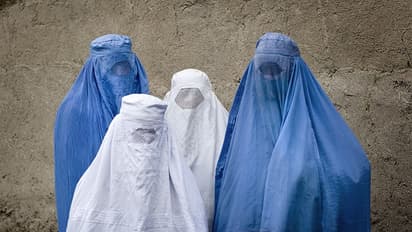EXPLAINED | Taliban prohibits women from hearing each other: What's behind the new rule?

Synopsis
Taliban's Minister for the Propagation of Virtue and Prevention of Vice, Mohammad Khalid Hanafi, said that it is the continuation of the previous restrictions concerning women's ability to recite the takbir (God is Great) or athan (the Islamic call for prayer).
In the latest crackdown on women, Afghanistan's Taliban government has closed universities for girls and women, and also implemented new order prohibiting women not to read the Quran aloud – even in the presence of only female audience. This recent edict, as documented by Virginia based Amu TV, deepens the extensive limitations on Afghan women, who have faced increasingly oppressive measures since the Taliban's return to power in 2021.
Taliban's Minister for the Propagation of Virtue and Prevention of Vice, Mohammad Khalid Hanafi, said that it is the continuation of the previous restrictions concerning women's ability to recite the takbir (God is Great) or athan (the Islamic call for prayer). Hanafi pointed out that any audible expression would be alike forbidden if women cannot perform the religious recitations in public, and therefore the singing or playing musical instruments would be banned.
As Hanafi so wisely opined, even a woman also cannot sing in the Ladies Special Train, or even speak loud, as her voice is the awwal – the private part which cannot be revealed even to other ladies.
This rule is the latest in the series of decrees that suppressed women in society together with the recent requirements to cover the face and body in public places. These rules, said to be endorsed by the acting Taliban emir Hibatullah Akhundzada, are presented as protections of the people against sin and temptation, meaning women's meaningful speech and public presence become sinful activities.
Human rights activists warn that the restrictions could extend beyond religious recitation, potentially impacting women's ability to engage in daily conversations. As per reports, Afghan women are now prohibited from making eye contact with men outside their immediate family, and women risk arrest for violating dress or conduct codes.
Even taxi drivers face consequences for transporting unaccompanied women, while medical staff operate under tightened oversight to limit female interactions.
Women's rights organizations globally have expressed grave concern. Roza Otunbayeva, the United Nations' special representative for Afghanistan, recently condemned the oppressive measures, labelling the escalating restrictions as "intolerable."
Check the Breaking News Today and Latest News from across India and around the world. Stay updated with the latest World News and global developments from politics to economy and current affairs. Get in-depth coverage of China News, Europe News, Pakistan News, and South Asia News, along with top headlines from the UK and US. Follow expert analysis, international trends, and breaking updates from around the globe. Download the Asianet News Official App from the Android Play Store and iPhone App Store for accurate and timely news updates anytime, anywhere.